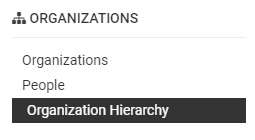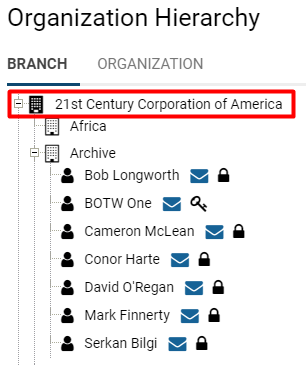Difference between revisions of "Organization hierarchy"
(→Definition) |
|||
| Line 1: | Line 1: | ||
==Definition== | ==Definition== | ||
| − | |||
| − | + | Organizations are hierarchically organized; each organization has a link to a single parent organization. This hierarchy can layer up to ''n''-levels high to depict a regular organizational structure. An organization hierarchy will have an [[internal]] hierarchy (for internal employees and affiliates) and an [[external]] hierarchy (for external contacts and organizations). The [[The Root Company|root organization]], which is the organization at the root of that specific SmartSimple copy, will appear on both the [[internal]] and [[external]] hierarchies. | |
| + | |||
| + | Organizations may represent a variety of entities from physical locations to organizational units. For example, you might have an '''office Location''' organization underneath a '''Department''' organization underneath a '''University''' organization underneath an umbrella '''Research Institutions''' organization. From this example, you can see how flexible organization types can be, as well as the hierarchical structure in organizing them. | ||
| + | |||
| + | Organizations and contacts are the most basic objects in SmartSimple. Organizations may store information about internal office branches as well as external clients or vendors. There are billing implications based on whether an organization is internal or external in the hierarchy - please contact your Account Manager for more information. | ||
| + | |||
| + | No matter which organization you are referring to, every organization is stored in the same format with certain permanent attributes that will be tracked for every organization, regardless of type. These standard attributes are referred to as [[Standard Fields]]: examples of standard fields might include the organization's name, address, and parent organization (whether it is a subsidiary of another organization) - this information is available to all organizations. | ||
| + | |||
* All contacts, regardless of whether they are able to log into the system ([[User|users]]), are associated with a single, specific level in either the [[Internal|internal]] or the [[External|external]] hierarchy. | * All contacts, regardless of whether they are able to log into the system ([[User|users]]), are associated with a single, specific level in either the [[Internal|internal]] or the [[External|external]] hierarchy. | ||
* An unlimited number of levels can be created in both the [[Internal|internal]] or [[External|external]] hierarchies. | * An unlimited number of levels can be created in both the [[Internal|internal]] or [[External|external]] hierarchies. | ||
| Line 10: | Line 16: | ||
:: {{Icon-Menu}} | :: {{Icon-Menu}} | ||
| − | |||
Under the '''Organizations''' category, select '''Organization Hierarchy.''' | Under the '''Organizations''' category, select '''Organization Hierarchy.''' | ||
Revision as of 13:57, 5 June 2019
Definition
Organizations are hierarchically organized; each organization has a link to a single parent organization. This hierarchy can layer up to n-levels high to depict a regular organizational structure. An organization hierarchy will have an internal hierarchy (for internal employees and affiliates) and an external hierarchy (for external contacts and organizations). The root organization, which is the organization at the root of that specific SmartSimple copy, will appear on both the internal and external hierarchies.
Organizations may represent a variety of entities from physical locations to organizational units. For example, you might have an office Location organization underneath a Department organization underneath a University organization underneath an umbrella Research Institutions organization. From this example, you can see how flexible organization types can be, as well as the hierarchical structure in organizing them.
Organizations and contacts are the most basic objects in SmartSimple. Organizations may store information about internal office branches as well as external clients or vendors. There are billing implications based on whether an organization is internal or external in the hierarchy - please contact your Account Manager for more information.
No matter which organization you are referring to, every organization is stored in the same format with certain permanent attributes that will be tracked for every organization, regardless of type. These standard attributes are referred to as Standard Fields: examples of standard fields might include the organization's name, address, and parent organization (whether it is a subsidiary of another organization) - this information is available to all organizations.
- All contacts, regardless of whether they are able to log into the system (users), are associated with a single, specific level in either the internal or the external hierarchy.
- An unlimited number of levels can be created in both the internal or external hierarchies.
Organization Hierarchy Overview
To access the organization hierarchy, click the 9-square menu icon on the top right of your page.
Under the Organizations category, select Organization Hierarchy.
The organization hierarchy associated with the SmartSimple instance will appear.
The first tab of your organization hierarchy lists internal contacts, while the second tab lists external contacts. In the below example, the internal hierarchy is titled Branch and the external hierarchy is titled Organization. The organization terminology is variable depending on the SmartSimple instance; however, the root organization will always appear first on both the internal and external lists.

